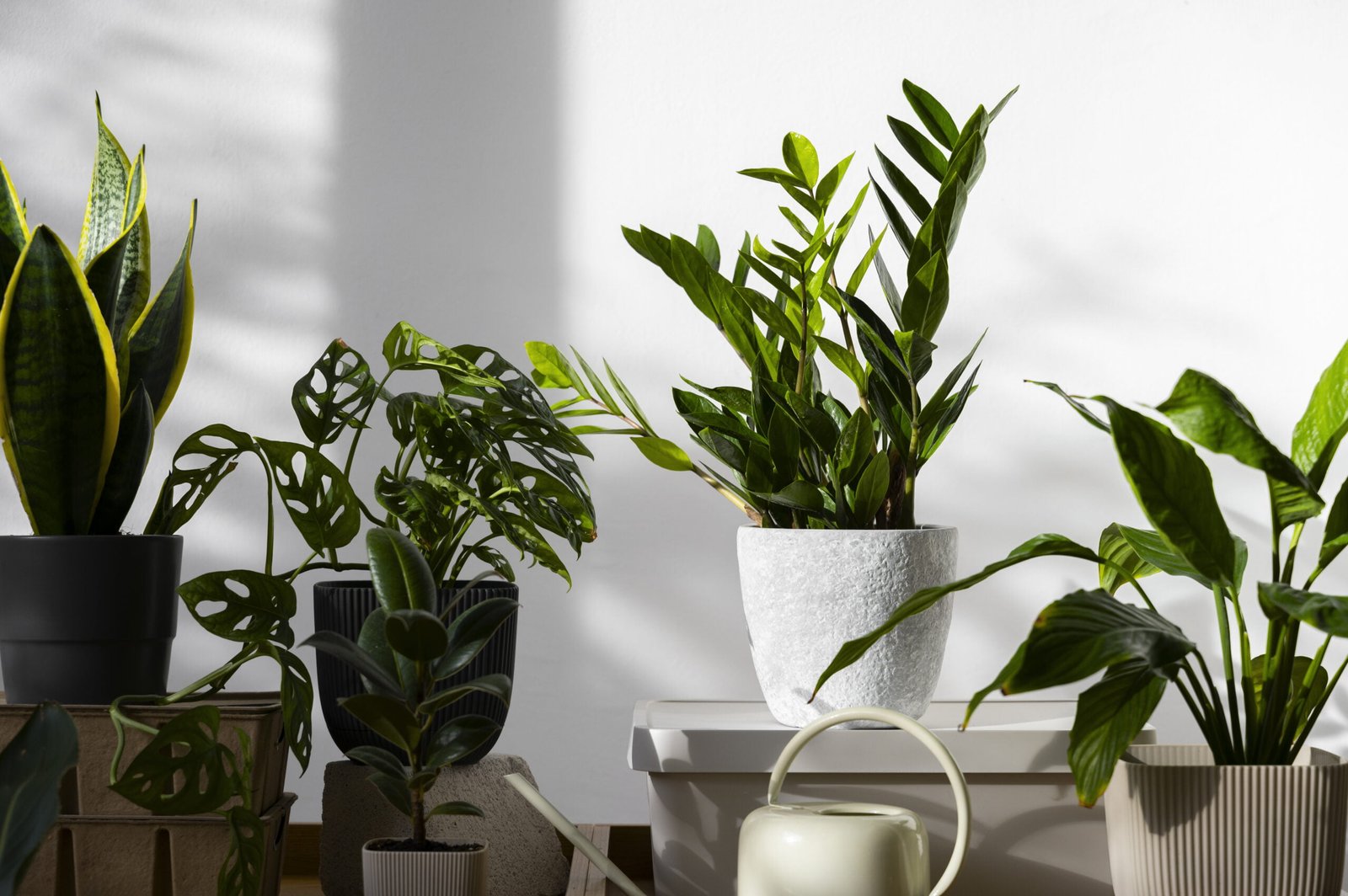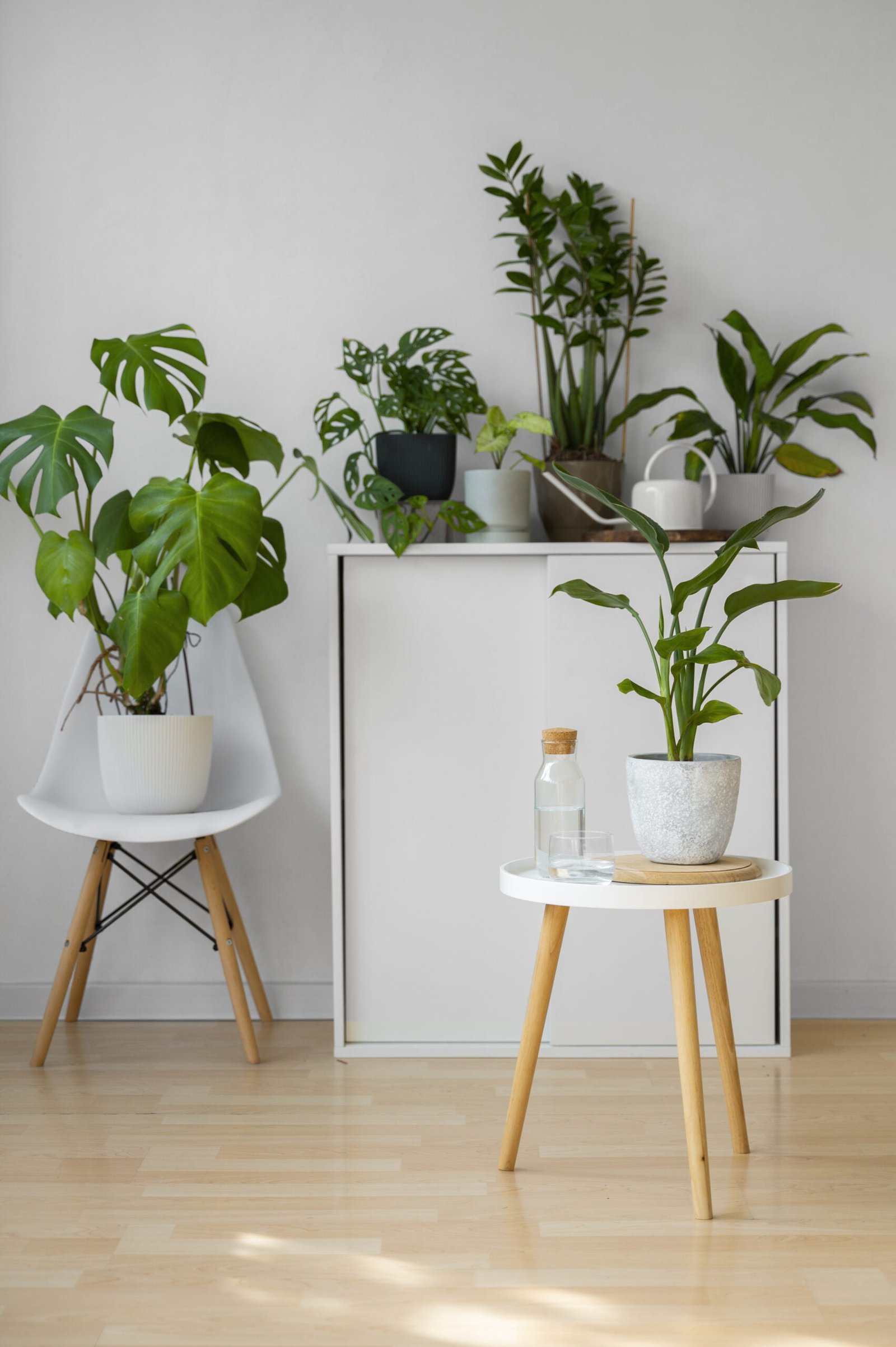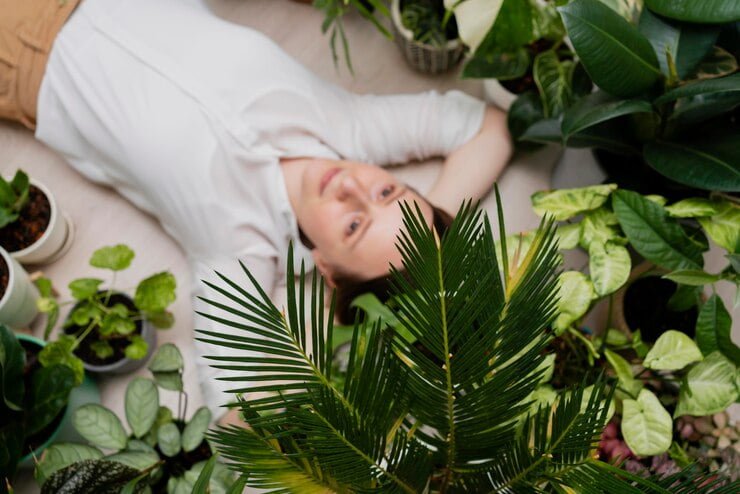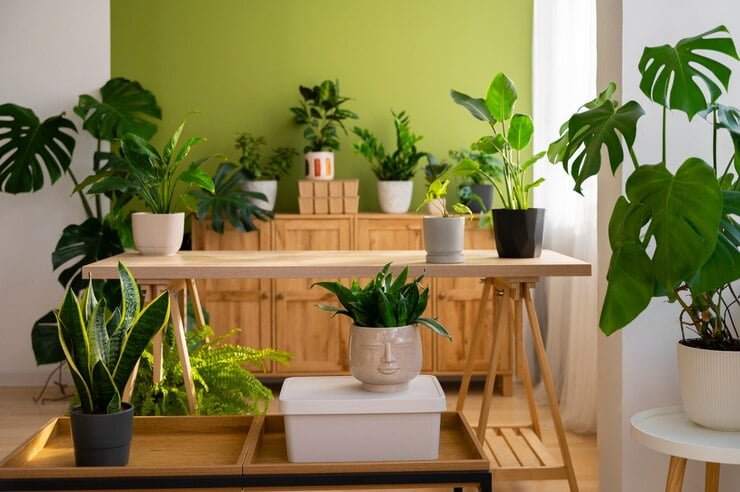Table of Contents
Wonderful benefits of having indoor plants in a home: Why You Should Go Green Indoors
What are the Wonderful benefits of having indoor plants in a home. Here is a detailed study of the benefits of having indoor plants at home:
Indoor Plants
Indoor plants are more than just a beautiful addition to your home décor. They offer a wide range of health, psychological, and environmental benefits that can transform your living space into a healthier and more serene environment. Whether you’re an avid gardener or just looking to improve your home’s atmosphere, introducing greenery indoors has many advantages.
are plants that are grown and maintained exclusively in the interior of buildings. These plants are adapted to thrive in indoor conditions, including low light levels and varying humidity and temperature. They are commonly used for decorative purposes, to enhance indoor air quality and contribute to the overall ambience of indoor spaces.
In this article, we’ll explore the benefits of having indoor plants in a home and why incorporating plants into your living spaces can positively impact your overall well-being.

1. Improved Air Quality
Indoor plants are well known for their ability to improve indoor air quality. They can help filter out common indoor pollutants such as formaldehyde, benzene, and trichloroethylene. Plants such as snake plant (Sansevieria), pothos (Epipremnum aureum), and peace lily (Spathiphyllum) are particularly effective in removing these toxins. In the process of phytoremediation, plants absorb and metabolize these substances through their leaves, roots, and stems, thereby cleaning the air. Additionally, plants release oxygen as a byproduct of photosynthesis, which can increase indoor oxygen levels.
2. Increased humidity
Plants can contribute significantly to indoor humidity levels through a process called transpiration. During respiration, plants absorb water through their roots and release it into the air through their leaves. This extra moisture can be especially beneficial in dry indoor environments, helping to relieve respiratory problems and dry skin. Increased humidity can also reduce the chance of static electricity and help preserve wooden furniture and musical instruments.

3. Reduction of stress and anxiety
Several studies show that being around plants can reduce stress and anxiety levels. Interactions with plants have been linked to reduced heart rates and blood pressure, contributing to a calming effect. The presence of plants in the home environment can create a calming environment and provide a natural way to relax. The act of tending to plants—watering, pruning, and observing their growth—can also offer meditation to escape the stresses of everyday life.
4. Improved Productivity and Focus
Plants can have a positive effect on cognitive function and productivity. Research shows that having plants in a work or study environment can improve concentration, memory retention and overall cognitive performance. Plants add a natural element to workplaces, which can boost creativity and reduce mental fatigue. For example, a study by the University of Exeter found that employees working in environments with plants were more productive and had higher levels of job satisfaction.
5. Better Mental Health

Caring for indoor plants can offer mental health benefits by providing a sense of purpose and accomplishment. Routine plant care such as watering, repotting and observing growth can be a form of mindfulness that helps distract from stress and anxiety. Cultivating plants can also improve mood and provide emotional support, contributing to a more positive outlook.
6. Better Aesthetics
Plants can dramatically increase the visual appeal of a home. They add color, texture, and life to interiors, making spaces feel more inviting and vibrant. Whether through a well-placed fern on a shelf, cascading pothos hanging in a corner, or a striking vine-leaf fig as a centerpiece, plants can complement and elevate home decor. Additionally, they can be used to create focal points or soften the lines of a room, making spaces more harmonious and balanced.
7. Connection with Nature
Indoor plants help bring elements of nature into indoor environments, which can be especially valuable in urban environments or during seasons when outdoor access to green spaces is limited. This connection to nature, often referred to as biophilia, can promote a sense of well-being and calm. Experiencing natural elements indoors can help combat feelings of loneliness and promote a sense of relaxation.
8. Noise Reduction
Plants can help reduce noise levels in the home. The texture and structure of plants and the soil around them can absorb, deflect or scatter sound waves, creating a quieter and more peaceful environment. This can be particularly useful in noisy urban areas or in homes where noise reduction is a priority for comfort and focus.
9. Educational Opportunities
Having indoor plants can offer valuable learning experiences. From understanding basic botany and plant biology to experimenting with different maintenance techniques and observing plant growth cycles, there are many educational aspects to explore. It can be especially attractive to families with children, who can learn about responsibility, ecosystems, and the importance of environmental responsibility.
10. Social Interaction
Indoor plants can act as a catalyst for social interaction. Sharing tips on plant care, exchanging cuttings or plants, or discussing plant-related topics with friends and family can foster social connections. Plant enthusiasts often create opportunities for meaningful social interactions in communities or online forums to share experiences, offer advice, and celebrate plant successes.
In summary, adding indoor plants to your home can have a profound effect on both your physical environment.
Plants That May Be Dangerous for Children or Pets
While indoor plants offer numerous benefits, some can be harmful or toxic to children and pets if ingested or touched. If you have young children or pets, it’s essential to know which plants may pose a risk and either avoid them or place them in inaccessible areas.
Here’s a list of common indoor plants that may be dangerous for children or pets:
1. Peace Lily (Spathiphyllum)Toxic to: Cats, dogs, children
- Toxic components: Calcium oxalate crystals
- Symptoms: Mouth irritation, excessive drooling, difficulty swallowing, vomiting.
- Details: The peace lily is popular for its elegant white blooms and low maintenance, but it’s highly toxic when ingested. Even touching the plant can cause irritation to the skin or mouth, especially in children and pets.
2. Snake Plant (Sansevieria trifasciata)
- Toxic to: Cats, dogs
- Toxic components: Saponins
- Symptoms: Nausea, vomiting, diarrhea.
- Details: Although it’s an excellent air purifier and hardy houseplant, snake plants can cause gastrointestinal upset if ingested by pets. It’s best to keep them out of reach of curious cats or dogs.
3. Philodendron
- Toxic to: Cats, dogs, children
- Toxic components: Calcium oxalate crystals
- Symptoms: Irritation of the mouth, swelling, drooling, vomiting, difficulty swallowing.
- Details: Philodendrons are easy to grow and are popular for their lush, leafy appearance. However, all parts of this plant are toxic if ingested, causing irritation in the mouth and digestive system.
4. Pothos (Epipremnum aureum)
- Toxic to: Cats, dogs, children
- Toxic components: Calcium oxalate crystals
- Symptoms: Oral irritation, swelling, drooling, difficulty breathing, vomiting.
- Details: Another popular houseplant for its air-purifying abilities, pothos is toxic to pets and children. It’s especially risky because the trailing vines can be easily accessed.
5. Aloe Vera
- Toxic to: Cats, dogs
- Toxic components: Saponins and anthraquinones
- Symptoms: Vomiting, diarrhea, lethargy, tremors.
- Details: While aloe vera is beneficial to humans for topical use, it can cause serious digestive issues if pets ingest it. Keep it out of reach from curious animals.
6. Dieffenbachia (Dumb Cane)
- Toxic to: Cats, dogs, children
- Toxic components: Calcium oxalate crystals
- Symptoms: Intense oral pain, swelling of the mouth, throat, and tongue, vomiting, difficulty breathing.
- Details: The Dieffenbachia plant can cause severe irritation when ingested. In pets and children, it may lead to swelling and difficulty breathing due to its sharp, needle-like crystals.
7. Sago Palm (Cycas revoluta)
- Toxic to: Cats, dogs, children
- Toxic components: Cycasin (a toxin)
- Symptoms: Vomiting, diarrhea, liver failure, seizures, and can be fatal.
- Details: Every part of the sago palm is highly toxic, but the seeds or nuts are the most dangerous. Ingesting even a small amount can lead to severe health issues, including liver damage and death, especially in pets.
8. Oleander (Nerium oleander)
- Toxic to: Cats, dogs, children
- Toxic components: Cardiac glycosides
- Symptoms: Nausea, vomiting, diarrhea, irregular heartbeat, and can be fatal.
- Details: While less common as an indoor plant, oleander is highly toxic if ingested. Even small amounts can cause serious heart problems in pets and children, making it one of the most dangerous plants on this list.
9. Jade Plant (Crassula ovata)
- Toxic to: Cats, dogs
- Toxic components: Unknown (suspected to be toxic due to compounds in sap)
- Symptoms: Vomiting, lethargy, slow heart rate, depression.
- Details: Popular in households for its succulent properties and low-maintenance care, the jade plant can cause vomiting and other symptoms in pets. The specific toxic compound is unknown but can have harmful effects if ingested.
10. English Ivy (Hedera helix)
- Toxic to: Cats, dogs, children
- Toxic components: Saponins
- Symptoms: Nausea, vomiting, diarrhea, breathing problems, rash upon skin contact.
- Details: English ivy is an attractive trailing plant but can be toxic if eaten by pets or children. In addition to gastrointestinal upset, it can also cause skin irritation.
11. ZZ Plant (Zamioculcas zamiifolia)
- Toxic to: Cats, dogs, children
- Toxic components: Calcium oxalate crystals
- Symptoms: Irritation of the mouth, throat, vomiting, diarrhea.
- Details: The ZZ plant is highly durable and almost impossible to kill, which makes it a favorite for beginners. However, it’s toxic to pets and children when ingested, causing oral irritation and stomach upset.
12. Fiddle Leaf Fig (Ficus lyrata)
- Toxic to: Cats, dogs
- Toxic components: Ficusin and psoralen
- Symptoms: Vomiting, drooling, oral irritation, skin irritation upon contact.
- Details: A stylish indoor plant, the fiddle leaf fig can cause mild to severe irritation when ingested by pets, leading to vomiting or oral discomfort.
13. Caladium (Elephant Ear)
- Toxic to: Cats, dogs, children
- Toxic components: Calcium oxalate crystals
- Symptoms: Oral irritation, pain, swelling, difficulty breathing, vomiting.
- Details: Caladium plants have large, colorful leaves, making them attractive houseplants. However, they are highly toxic if ingested, causing painful symptoms in both children and pets.
Safety Tips for Homes with Children and Pets:
- Choose Non-Toxic Plants: Opt for safe indoor plants like Boston ferns, spider plants, bamboo palms, and prayer plants, which are non-toxic to children and pets.
- Keep Plants Out of Reach: Place toxic plants in areas that are inaccessible to pets or young children, such as high shelves or hanging baskets.
- Teach Children About Plant Safety: Educate your children not to touch or ingest plants unless they know they are safe.
- Monitor Your Pets: Keep an eye on your pets, especially if they show interest in chewing on plants. Consider using deterrent sprays if necessary.
- Research Before Buying: Always research a plant’s toxicity level before bringing it into a home with children or pets.
While indoor plants bring numerous benefits to a home, some can be dangerous to curious children and pets. If you love plants but want to ensure the safety of your family, consider choosing non-toxic varieties or keeping toxic plants in areas where they can’t be accessed. Always consult a veterinarian or a poison control center if you suspect your child or pet has ingested a harmful plant.
Can Indoor Houseplants Trigger Allergies or Asthma?
Yes, indoor houseplants can potentially trigger allergies or asthma in some individuals. While many people enjoy the aesthetic and health benefits of having plants indoors, certain types of houseplants can produce allergens or irritants that may affect those with sensitivities. Understanding how indoor plants can contribute to allergies and asthma is crucial for creating a comfortable living environment.
1. Pollen Production
Some indoor plants produce pollen, which can trigger allergic reactions in sensitive individuals. Pollen can become airborne and may irritate the respiratory system, leading to symptoms such as sneezing, coughing, nasal congestion, and difficulty breathing.
Plants That May Produce Pollen:
- Ficus (Weeping Fig): Known for its attractive foliage, Ficus can release pollen that may affect allergy sufferers.
- Orchids: While generally less allergenic, some orchid species can produce pollen that may irritate sensitive individuals.
2. Mold Growth
Houseplants can also contribute to mold growth in the soil, especially if the plants are overwatered or if the potting soil is kept too moist. Mold spores can become airborne and trigger allergic reactions or asthma attacks in sensitive individuals.
Mold-Related Allergies:
- Mold can produce symptoms like nasal congestion, sneezing, coughing, and itchy or watery eyes.
- Regularly check soil moisture levels and allow the top inch of soil to dry out before watering to prevent mold growth.
3. Sap and Latex Irritation
Certain houseplants contain sap or latex, which can cause skin irritation or respiratory issues in sensitive individuals. These substances may cause allergic reactions upon contact or inhalation.
Examples of Irritating Plants:
Rubber Plant (Ficus elastica): The sap can cause skin irritation and may trigger allergies in some people.
Poinsettia: The milky sap can irritate the skin and cause allergic reactions in sensitive individuals.
4. Volatile Organic Compounds (VOCs)
Some indoor plants can release volatile organic compounds (VOCs), which can contribute to poor indoor air quality and potentially trigger asthma or allergy symptoms. VOCs are organic chemicals that can evaporate at room temperature, leading to respiratory irritation and other health issues.
Plants Known for VOC Emission:
- Spider Plant: While generally safe, it can release small amounts of VOCs.
- Peace Lily: Known for its air-purifying abilities, it may also emit VOCs that could affect sensitive individuals.
5. Dust Accumulation
Houseplants can accumulate dust on their leaves, which can become airborne and trigger allergies when disturbed. Regular maintenance, such as cleaning leaves, is essential to minimize dust accumulation and prevent respiratory issues.
Tips to Reduce Dust Accumulation:
- Wipe leaves regularly with a damp cloth to remove dust.
- Keep plants in areas that are easy to clean and dust-free.
6. Individual Sensitivities
It’s important to note that individual sensitivities vary widely. While some people may experience allergic reactions to certain plants, others may have no issues at all. Understanding your own sensitivities and being aware of specific plants is crucial in managing indoor air quality and comfort.
How to Minimize Allergies and Asthma Triggers
- Choose Hypoallergenic Plants: Some plants are less likely to trigger allergies or asthma. Consider options like:
- Snake Plant (Sansevieria)
- Spider Plant (Chlorophytum comosum)
- Bamboo Palm (Chamaedorea seifrizii)
- Maintain Proper Plant Care: Ensure plants are well-maintained to prevent mold growth and dust accumulation:
- Water plants appropriately to avoid overwatering.
- Use well-draining potting soil.
- Keep Indoor Humidity Balanced: Maintain humidity levels between 30% and 50% to prevent mold growth and respiratory irritation.
- Monitor Air Quality: Consider using air purifiers with HEPA filters to reduce airborne allergens and irritants.
- Consult with Allergists: If you or a family member experiences persistent symptoms, consult with a healthcare professional or allergist to identify specific triggers and develop a management plan.
While indoor plants can enhance your home environment, they may also trigger allergies or asthma in sensitive individuals. Understanding which plants may pose risks, maintaining proper plant care, and taking preventive measures can help create a healthier indoor space for everyone. By being mindful of your indoor plant choices and their impact on air quality, you can enjoy the benefits of greenery without compromising your health.
FAQ: Indoor Plants – Benefits, Risks, and Care Tips
1. What are the main benefits of having indoor plants?
Indoor plants offer numerous benefits, including:
- Improved air quality: Many plants purify the air by removing toxins and producing oxygen.
- Enhanced mood and productivity: Being around greenery can reduce stress, improve focus, and boost mood.
- Better humidity control: Plants naturally increase humidity, which can help reduce dry air issues.
- Aesthetic appeal: Indoor plants beautify spaces and create a calming environment.
- Health benefits: Some studies suggest indoor plants can help lower blood pressure and improve mental well-being.
2. Can indoor plants improve air quality?
Yes, certain indoor plants can remove airborne toxins like formaldehyde, benzene, and carbon monoxide, and they help replenish oxygen in enclosed spaces. Plants like the spider plant, peace lily, and snake plant are well-known for their air-purifying qualities.
3. Can indoor plants cause allergies or asthma?
Some indoor plants can trigger allergies or asthma, particularly those that produce pollen (like the weeping fig) or harbor mold in overly damp soil. Dust accumulation on leaves can also worsen respiratory symptoms. To reduce these risks, choose hypoallergenic plants and maintain proper care by controlling moisture levels and cleaning leaves regularly.
4. Which indoor plants are safe for homes with children and pets?
If you have children or pets, it’s important to choose non-toxic plants. Safe options include:
- Spider Plant (Chlorophytum comosum)
- Areca Palm (Dypsis lutescens)
- Boston Fern (Nephrolepis exaltata)
- Bamboo Palm (Chamaedorea seifrizii)
Always research plant toxicity before introducing a new plant into your home.
5. What are some common houseplants that are toxic to pets or children?
Some houseplants contain toxic substances that can be harmful if ingested. Common toxic plants include:
- Peace Lily (Spathiphyllum)
- Philodendron
- Snake Plant (Sansevieria)
- Aloe Vera
- Sago Palm
If you suspect that a child or pet has ingested a toxic plant, contact a healthcare professional or veterinarian immediately.
6. How can I prevent mold from growing in my plant’s soil?
Mold thrives in moist, poorly ventilated environments. To prevent mold in your plant’s soil:
- Avoid overwatering: Let the top inch of soil dry out before watering again.
- Use well-draining soil and pots with drainage holes.
- Place plants in areas with good air circulation.
- Remove dead leaves or plant debris from the soil regularly.
7. How often should I water my indoor plants?
The watering needs of indoor plants vary by type, but a general rule is to water when the top inch of soil feels dry. Overwatering is a common mistake, so it’s better to underwater than overwater in most cases. Research the specific needs of each plant and adjust based on the season and humidity levels.
8. What are some low-maintenance indoor plants?
If you’re looking for easy-to-care-for plants, consider:
- Snake Plant (Sansevieria)
- ZZ Plant (Zamioculcas zamiifolia)
- Spider Plant (Chlorophytum comosum)
- Aloe Vera
These plants are hardy and can thrive in various light conditions with minimal watering.
9. Can indoor plants help reduce stress?
Yes, studies have shown that being around plants can reduce stress levels, improve mood, and promote a sense of calm. Indoor plants can contribute to a more relaxing and tranquil atmosphere, making them especially beneficial in homes and workplaces.
10. What is the best way to clean indoor plant leaves?
To remove dust and maintain healthy leaves:
Wipe them with a damp cloth.
- For larger plants, you can shower them gently with lukewarm water in the sink or bathtub.
- Avoid using harsh chemicals or sprays unless they are specifically designed for plants.
11. Can I keep plants in low-light rooms?
Yes, several plants can thrive in low-light conditions, including:
- Snake Plant (Sansevieria)
- ZZ Plant
- Pothos (Epipremnum aureum)
- Cast Iron Plant (Aspidistra elatior)
These plants are well-suited for areas with little natural light and can adapt to indoor environments.
12. How can I improve indoor air quality with plants?
To maximize the air-purifying benefits of indoor plants:
- Incorporate a variety of air-purifying plants like Spider Plant, Peace Lily, and English Ivy.
- Place them in multiple rooms to increase the oxygen levels and remove toxins.
- Make sure plants are properly cared for and healthy, as unhealthy plants may not offer the same benefits.
13. Can houseplants attract pests indoors?
Yes, houseplants can attract pests like spider mites, aphids, and fungus gnats, especially in overwatered or poorly maintained plants. To prevent pest infestations:
- Inspect new plants before bringing them indoors.
- Keep plants clean and remove dead leaves regularly.
- Use insecticidal soap or natural pest control solutions if necessary.
By choosing the right plants, maintaining them properly, and considering individual sensitivities, you can enjoy the many benefits of indoor plants while minimizing any potential risks.
Conclusion
Conclusion: The Benefits and Risks of Having Indoor Plants
Indoor plants offer a wide range of benefits that enhance both physical and mental well-being. They purify the air by removing toxins, increase humidity, improve focus and productivity, and create a calming, aesthetically pleasing environment. Additionally, certain plants have been shown to reduce stress, boost mood, and even improve sleep quality, making them excellent additions to homes and work spaces.
However, it’s important to be aware of the risks associated with having indoor plants, especially for households with children, pets, or individuals prone to allergies and asthma. Some plants produce pollen, contain toxins, or harbor mold that may trigger allergic reactions or respiratory issues. Plants like peace lilies, snake plants, and philodendrons, though popular, can be toxic if ingested by pets or children. Over watering plants can lead to mold growth, which can worsen indoor air quality and trigger asthma symptoms.
To maximize the benefits of indoor plants while minimizing risks, it’s essential to choose the right plants for your environment. Opt for non-toxic, hypoallergenic varieties if you have sensitive household members, and ensure proper plant care to prevent issues like mold and dust accumulation.
In conclusion, indoor plants can significantly enhance your living space, contributing to a healthier and more enjoyable home. By selecting suitable plants and maintaining them properly, you can enjoy the benefits while minimizing potential risks.

